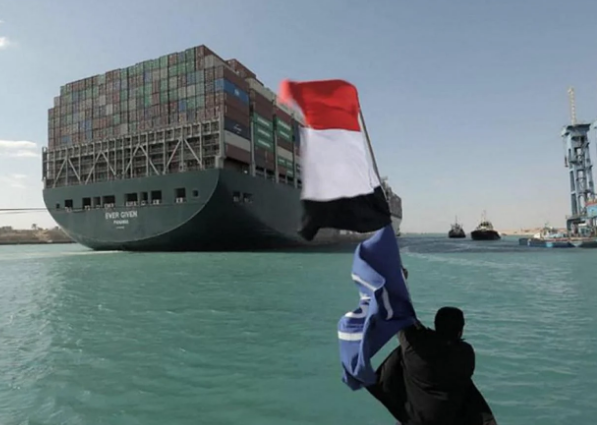Suez Canal: Egypt seeking $1bn compensation for ship blockage
About 15 percent of world shipping traffic transits the vital waterway, a critical source of foreign currency revenue for the country

About 15 percent of world shipping traffic transits the vital waterway, a critical source of foreign currency revenue for the country
Egypt should receive more than one billion dollars in compensation from the company that owned the ship that blocked the Suez Canal, the waterway’s managing body has said.
The mammoth Ever Given container ship was finally freed in the Suez Canal on Monday, unblocking the vital artery that had been closed off to international shipping for six days.
The waterway is a crucial economic lifeline for Egypt, which poured resources into unblocking the ship.
On Wednesday, the head of the Suez Canal Authority (SCA) Osama Rabie said he estimated the compensation that Egypt would likely receive from the company that owns the Ever Given would reach more than $1bn.
The 400-metre-long Ever Given grabbed international headlines on 23 March after it was jammed diagonally across a southern section of the Suez Canal in high winds, halting traffic on the shortest shipping route between Europe and Asia.
About 15 percent of world shipping traffic transits the Suez Canal, which is an important source of foreign currency revenue for Egypt.
Shipping rates for oil-product tankers nearly doubled after the ship became stranded, and the blockage disrupted global supply chains, threatening costly delays for companies already dealing with Covid-19 restrictions.
The head of the SCA said that the compensation would be discussed after the investigations into the accident are completed.
“This is a state’s right, God willing, we will reach a billion and a little more [in compensation],” Rabie said in an interview with the Sada Al Balad channel on Wednesday.
Rabei pointed out that the damages include halting navigation traffic in the Suez Canal, which generates daily revenues for Egypt estimated at $14m.
He added that the SCA will calculate the costs of equipment work, damages, and canal workers over a period of six days in order to float the ship.
“This is the right of the country, we will not waste a penny,” he said.
“We left the boat intact.”
Rabie said that the investigations into the incident began on Wednesday by a committee consisting of about six individuals, most of them from the SCA, in addition to a consultant from outside the country who will be concerned with estimating the amount of compensation.
Rabei said that the ship will not leave Egypt before the end of the investigation. If the company that owns the ship signs an agreement to pay the compensation, the matter will end within two or three days, he added.
In the event that the company refuses to do so, he said the matter will turn into a civil case before the court.
“[The ship] has cargo worth three and a half billion dollars … We saved them from many things,” while confirming that the company showed its cooperation with the Canal Authority during the crisis and sent the Dutch company Smit to assist in floating the ship.
Poor infrastructure
Meanwhile, shipping industry sources told Reuters on Thursday that Egypt must move quickly to upgrade its technical infrastructure in order to avoid future shipping disruption.
The sources said that specialist equipment and associated procedures have long struggled to keep up with the ever increasing size of commercial vessels.
Source:middleeasteye.net


